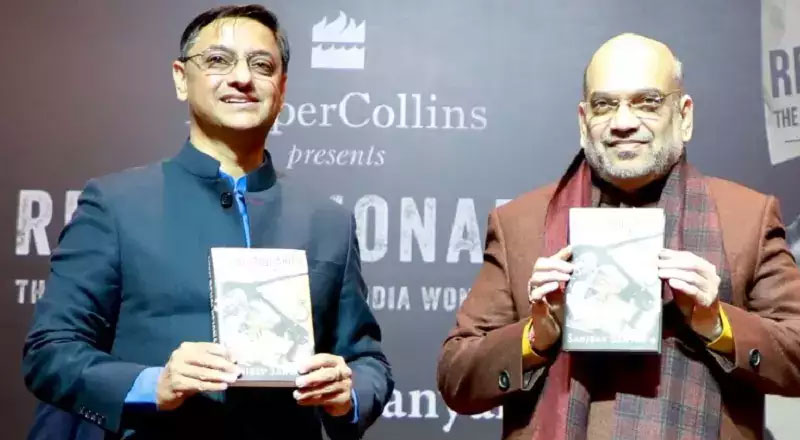Shah was speaking at the launch of the book, Revolutionaries: The Other Story of How India Won Its Freedom, written by Sanjeev Sanyal, a member of the Prime Minister’s Economic Advisory Council.
SAYING THAT the freedom struggle led by the Congress succeeded only because of the “fire of patriotism” ignited by armed revolutionaries, Home Minister Amit Shah said on Wednesday that the latter, unfortunately, did not get due recognition in India’s written history.
Shah was speaking at the launch of the book, Revolutionaries: The Other Story of How India Won Its Freedom, written by Sanjeev Sanyal, a member of the Prime Minister’s Economic Advisory Council.
Shah said only one story about the freedom struggle has been “repeatedly narrated”. “Only one point of view has been thrust upon people through education and history books. I don’t say that the non-violent movement had no contribution in the freedom struggle, or that it is not part of history… But this narrative that no one else had any contribution is not right,” he said.
Many people like me believe that the Congress’s movement was successful because of the fire of patriotism ignited by the armed revolution. I believe it, and I can prove it also. If the armed struggle had not continued parallelly, it would have probably taken many more decades to get independence,” he said.
The history of India should be written not on the basis of victory or defeat, but by judging the struggle and efforts of all. That is how history is complete,” Shah said. “To rid the country of colonial mindset, the biggest work, I feel, needs to be done in the field of written history, to free India’s written history of the colonial mindset,” he said.
He said many historians did not mention the contributions of armed revolutionaries like Bhagat Singh and Aurobindo Ghose. Shah said their efforts have been portrayed as sporadic acts of individual bravery, whereas the truth was that they were a well-thought-out, collective effort driven by a common ideology. “We have to understand it, accept it, and propagate it as well,” he said.
“Some people have suppressed this narrative but I want to say to those people that history is very cruel… no one can distort history… it comes out eventually,” he said
They don’t know that when Bhagat Singh was hanged, no fire was lit in the kitchens from Lahore to Kanyakumari. Now, if you write history saying the country was not free when Bhagat Singh was martyred, that is not the right judgement,” he said.
Shah said Netaji Subhash Chandra Bose and the INA also did not get the respect and place they should have got in the history of the country.
Saying that the armed revolutionaries were not violent by nature but viewed violence as a means to achieve freedom, Shah said: “We have to bring our history out of the binary of extremist versus moderates”
He said it is time to remove “distortions” from the history of India’s freedom movement. “Many people blame the Communists or the British mindset while talking about how history was distorted. Sometimes, even the Congress is blamed. But I ask, who is stopping us now,” he said.
He asked students and scholars of history to take up the responsibility, adding that it cannot be the government’s responsibility alone.
Shah said Veer Savarkar was the first to challenge the established narrative of India’s freedom struggle. “The entire world used to view the 1857 revolution as a mutiny. He was the first to call it the country’s first freedom struggle. That was the start of altering the narrative,” he said.
Sanyal’s book, he said, would start a new narrative on India’s freedom struggle.
Shah said literary personalities like Bankim Chandra Chattopadhyay, farmers and tribals were equally responsible for India’s independence. “But those who were responsible for telling the story of freedom struggle from our point of view after Independence, I think, were somehow at fault,” he said.
The British had left, but history was written with the British-ness that they had left behind, and because of that, there is this confusion even today,” he said.





